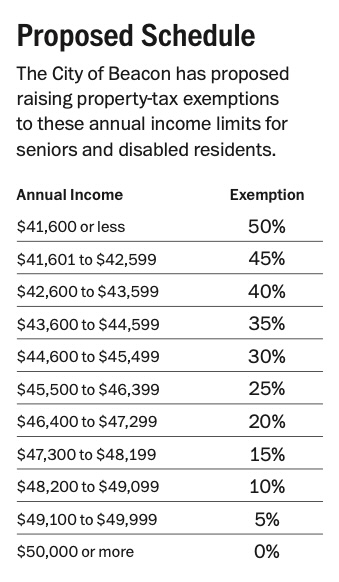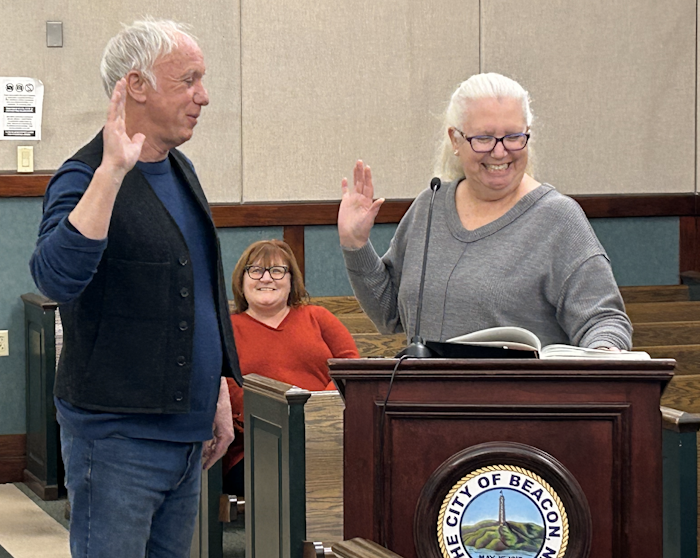Income levels last updated 20+ years ago
The Beacon City Council is expected to schedule public hearings for Feb. 3 on laws that would expand property tax exemptions for both senior citizens and disabled residents with limited incomes.
To determine exemptions, the city uses sliding income scales that haven’t been updated in more than 20 years. If approved, new income brackets and exemption levels would apply to residential tax bills beginning in 2026.
The city exempts 50 percent of a home’s assessed value from taxation for property owners 65 or older when their annual household income is less than $20,500. The senior income scale, which has been in place since 2001, incrementally increases to encompass households earning between $25,301 and $26,200. Those homeowners are eligible for a 20 percent exemption.
The new schedule would give the 50 percent exemption to senior households earning $41,600 or less and would bring Beacon’s income brackets and exemptions in line with those used by Dutchess County. The schedule would also gradually increase income-eligibility limits, with the final bracket — households making between $49,100 and $49,999 — allowed a 5 percent exemption.
The income schedule for disabled residents has not been updated since 1999. It gives the 50 percent exemption to households earning $18,500 or less annually. If the changes are approved, the 50 percent bracket would increase to $41,600 or less, with a 5 percent exemption ceiling for households earning between $49,100 and $49,999. There is no age limit for residents seeking disability exemptions.
The figures are higher than the U.S. poverty line, which is $21,150 annually for a household of two and $31,150 for a household of four.
The proposed adjustments are not only overdue but would give residents greater purchasing power in the face of ongoing inflation, which rose by 2.9 percent in December, City Administrator Chris White told the council during its Monday (Jan. 13) workshop. City Assessor Kathy Martin, who suggested the changes, said she was unsure how many additional residents would benefit.

While the adjustments would require council members to pass two laws, the public hearings may be held concurrently because the programs are similar, said City Attorney Christian Gates.
The senior exemption “truly helps people to stay in their homes,” Martin said. “It can cut their taxes in half.”
Seniors may apply for the city’s limited-income exemption and the Enhanced STAR exemption, a program for homeowners 65 and older administered by New York State that applies to school taxes. The Enhanced STAR program comes with its own income restrictions: In 2025, it is $107,300 annually or less for a homeowner and spouse.
The Enhanced STAR limit is based on adjusted gross income, while the city programs base their brackets on total income, including interest, rental income and Social Security, Martin noted. Taxes not collected by the city because of exemptions are subsidized by other taxpayers.
Exemption applications are due to Martin by March 1 and must be renewed each year. See dub.sh/NY-exemptions. For Enhanced STAR, see tax.ny.gov/star.
Fishkill Avenue zoning
The Fishkill Avenue Concepts Committee, an 11-member citizen group studying zoning, streetscapes, non-vehicular access and other questions related to the northeast section of Beacon, will share preliminary zoning recommendations for the corridor with the City Council in February. But Amber Grant, an at-large representative, said Monday (Jan. 13) that she wants to begin the conversation during the council’s next workshop, on Jan. 27.
The city’s vision for Fishkill Avenue has been a topic of interest since Mayor Lee Kyriacou created the committee a year ago. When J.C. Calderon, the committee chair, gave the council an update on its work in November, Grant said she wanted to get a head start on zoning “to minimize the stuff that we absolutely don’t want to be happening” around the busy thoroughfare.
In lieu of enacting a building moratorium, she reiterated Monday her desire to move quickly on interim zoning changes.
“I’m talking about things that the community is talking about — proposals that are in the Planning Board,” Grant said. “I won’t make any secret about that. I am hearing so many questions everywhere I go. People are asking, ‘What are you guys doing?’ ”
The corridor has one project under review by the Planning Board: a proposal to convert 420-430 Fishkill Ave., the former site of the Healey Brothers Ford dealership, to a Dunkin’ coffeehouse with a drive-thru, additional commercial space and three apartments on the second floor.
The board last year approved applications from Carvana, the used-car retailer, at 410 Fishkill Ave. and Soka Gakkai International, a Buddhist organization, at 409 Fishkill Ave.
Although Kyriacou missed Monday’s meeting, every other council member said they agreed with Grant. Paloma Wake, the second at-large representative, said she is concerned about adding vehicle-related infrastructure in the corridor “that we can’t take back.”
“I am hearing from the community on a regular basis about a specific concern, and I would like to address that,” Grant added. “I don’t think we can wait any longer.”
Gates, the city attorney, noted that it can be challenging to enact zoning changes while applications for development are pending, but there’s no one-size-fits-all answer regarding legality. Any changes proposed by the council would be subject to a public hearing before voting.

